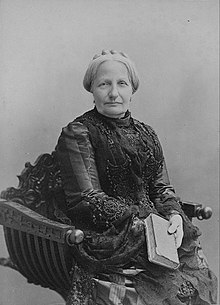
Back Teresa Cristina Afrikaans Teresa Cristina Brasil Cāserin ANG تيريزا كريستينا إمبراطورة البرازيل Arabic تيريزا كريستينا امبراطورة البرازيل ARZ Тереза Кристина Бурбон-Двете Сицилии Bulgarian Teresa Cristina an Div Sikilia Breton Teresa de Borbó-Dues Sicílies Catalan Tereza Marie Neapolsko-Sicilská Czech Teresa Maria Cristina von Bourbon-Sizilien German Θηρεσία Χριστίνα των Δύο Σικελιών Greek
| Teresa Cristina | |||||
|---|---|---|---|---|---|
 Portrait by Nadar, c. 1888 | |||||
| Empress consort of Brazil | |||||
| Tenure | 30 May 1843 – 15 November 1889 | ||||
| Born | 14 March 1822 Naples, Two Sicilies | ||||
| Died | 28 December 1889 (aged 67) Porto, Portugal | ||||
| Burial | 5 December 1939 St. Peter of Alcantara Cathedral, Petrópolis, Brazil | ||||
| Spouse | |||||
| Issue Detail | |||||
| |||||
| House | Bourbon-Two Sicilies | ||||
| Father | Francis I of the Two Sicilies | ||||
| Mother | María Isabella of Spain | ||||
| Signature | |||||
Dona Teresa Cristina (14 March 1822 – 28 December 1889), nicknamed "the Mother of the Brazilians",[2] was Empress of Brazil as the consort of Emperor Dom Pedro II from their marriage on 30 May 1843 until 15 November 1889, when the monarchy was abolished. Born a princess of the Kingdom of the Two Sicilies in present-day southern Italy, Teresa Cristina was the daughter of King Don Francesco I (Francis I) of the Italian branch of the House of Bourbon and his wife Maria Isabel (Maria Isabella). It was long believed by historians that the Princess was raised in an ultra-conservative, intolerant atmosphere which resulted in a timid and unassertive character in public and an ability to be contented with very little materially or emotionally. Recent studies revealed a more complex character, who despite having respected the social norms of the era, was able to assert a limited independence due to her strongly opinionated personality as well as her interest in learning, sciences and culture.
The Princess was married by proxy to Pedro II in 1843. Her spouse's expectations had been raised when a portrait was presented that depicted Teresa Cristina as an idealized beauty, but he was displeased by his bride's appearance upon their first meeting later that year. Despite a cold beginning on the part of Pedro, the couple's relationship improved as time passed, due primarily to Teresa Cristina's patience, kindness and generosity. These traits also helped her win the hearts of the Brazilian people, and her distance from political controversies shielded her from criticism. She also sponsored archaeological studies in Italy and Italian immigration to Brazil.
The marriage between Teresa Cristina and Pedro II never became passionately romantic, although a bond based upon family, mutual respect and fondness did develop. The Empress was a dutiful spouse and unfailingly supported the Emperor's positions and never interposed with her own views in public. She remained silent on the topic of his suspected extra-marital relationships—including a liaison with her daughters' governess. In turn, she was treated with unfailing respect and her position at court and home was always secure. Of the imperial couple's four children, two boys died in infancy and a daughter died of typhoid fever at the age of 24.
The imperial family was sent into exile after a coup d'état staged by a clique of army officers in 1889. Being cast from her beloved adopted land had a devastating effect on Teresa Cristina's spirit and health. Grieving and ill, she died of respiratory failure leading to cardiac arrest a month after the monarchy's collapse. She was greatly loved by her subjects, both during her lifetime and afterwards. She was even respected by the republicans who overthrew the Empire. Despite having had no direct impact on Brazil's political history, Teresa Cristina is well regarded by historians not only for her character and irreproachable behavior, but also for her sponsorship of Brazilian culture.
- ^ Calmon 1975, p. 211.
- ^ See:
- Carvalho 2007, p. 73,
- Behar 1980, p. 51,
- Cenni 2003, p. 80,
- Antunes 2009, p. 183.
© MMXXIII Rich X Search. We shall prevail. All rights reserved. Rich X Search